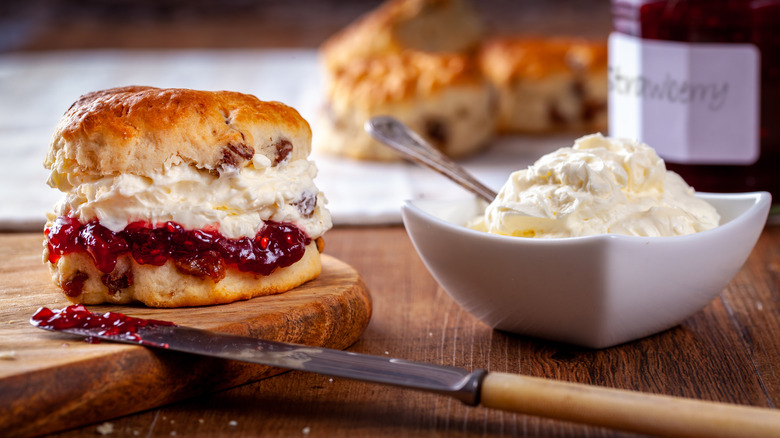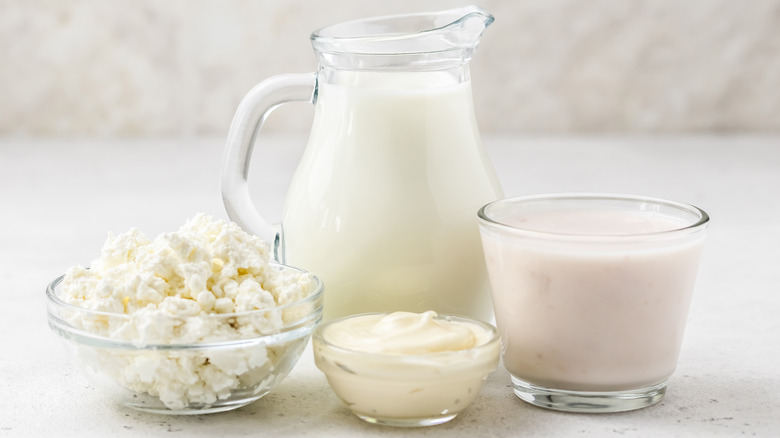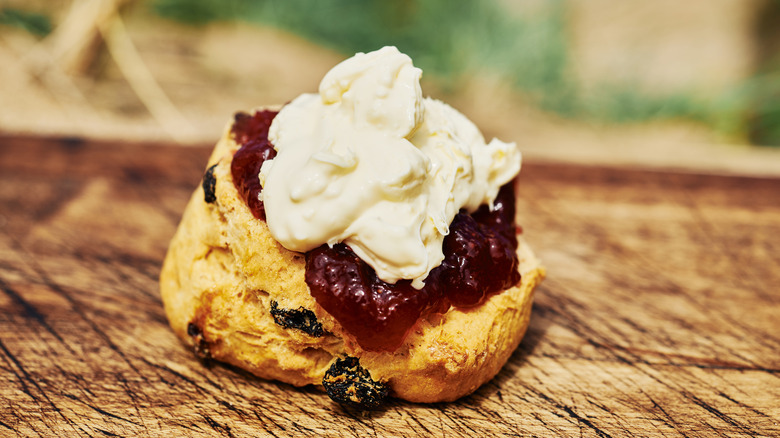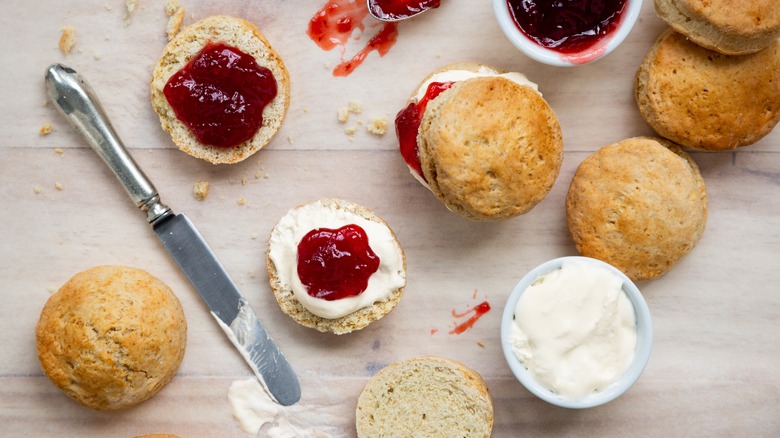What Is Clotted Cream And Why Is It Illegal In The US?
We may receive a commission on purchases made from links.
For some Americans, just hearing the words "clotted cream" makes them long to hop right over the pond to England and sit down to a fancy table piled high with fresh scones and fruity jams. The problem is, American fans would likely have to go all the way to England to get their hands on the good stuff, as it's nearly impossible to find clotted cream in the United States.
Clotted cream is a traditional English cream topping enjoyed on scones in tea rooms across the country. This rich, light yellow spread is sometimes called Devonshire cream or Cornish clotted cream, depending on the region in which it was made. To be considered authentic clotted cream, it must typically be produced exclusively in either Devon or Cornwall.
Its exclusivity extends beyond England, however, as clotted cream is technically illegal in America. Why? True clotted cream is made with unpasteurized milk, and the FDA officially banned the distribution of any milk or milk products that haven't been pasteurized in America in 1987. When it comes to clotted cream, the score is England: 1, America: 0.
Why is clotted cream illegal in the US?
Unpasteurized essentially means that the milk or cream is raw — it hasn't undergone any kind of processing to alter it or remove bacteria. The reason that clotted cream is made with unpasteurized milk is that the natural, unmodified structure of the fat helps it "clot," which occurs when the cream separates from the whey.
Pasteurization became a regular method of food safety in the U.S. back in the 1920s. It was introduced as a way to eliminate harmful germs or contamination, which were thought to cause widespread outbreaks of illness and disease. After proving to be a successful method to curb and reduce foodborne illness, it was eventually mandated at the federal level. According to the Virginia Department of Health, today most milk is pasteurized by either heating it to a minimum of 145 degrees Fahrenheit for at least 30 minutes, or to a minimum of 161 degrees Fahrenheit for at least 15 seconds. This process kills off the bacteria, and then the milk is chilled again.
While states are able to make some of their own rules regarding raw and unpasteurized dairy, the distribution of such products is banned by the FDA, so you'll have a hard time finding clotted cream in any U.S. grocery store. Therefore, usually, the best way to get your hands on some is to make it yourself.
How to make your own clotted cream
If you're in one of those states that allows the sale of raw milk and you know where to find some, that's obviously the ideal starting point for your homemade clotted cream. If you're out of luck, stick to heavy cream — but look for one that's labeled "pasteurized" rather than "ultra-pasteurized" to ensure proper clotting. The good news is that making clotted cream is pretty easy. The bad news is that you'll need to put the time in.
Clotted cream is made by heating and then cooling full-fat milk or cream to achieve its thick, creamy consistency (similar to that of soft cream cheese or butter). To do this at home, first heat the cream in the oven in a shallow glass or ceramic pan. Let the cream slowly cook at 175 degrees Fahrenheit for 12 hours.
Once it's out of the oven, let it cool for 30 minutes and then cover the cream, refrigerating it for another 12 hours. Once it's fully chilled, you'll be able to peel away the top layer of slightly cooked, "clotted" cream — that's the part you're after. The last step is to place the thickened cream in a separate bowl and stir it up until it reaches the smooth, creamy consistency you desire.
Where you can buy a version of clotted cream in the US
While you're unlikely to find authentic clotted cream in America, you can still purchase it online and at some major U.S. grocery stores. Just keep in mind that what you're buying is the FDA-approved, pasteurized version of clotted cream. Therefore, the flavor and texture may differ slightly from what you'd experience in England.
One of the major brands available for purchase in the U.S. is Devon Cream Company. You can find its jars of clotted cream in various sizes online at Amazon, or at several major grocery stores and retailers like Shoprite and Walmart. Made from pasteurized cow's milk, this clotted cream is free of additives and preservatives and will stay fresh for up to five days after opening.
You might also be able to find clotted cream products at specialty markets. Additionally, keep an eye out at bakeries or restaurants that serve this creamy goodness, as some also sell jars of it. Happy hunting!




